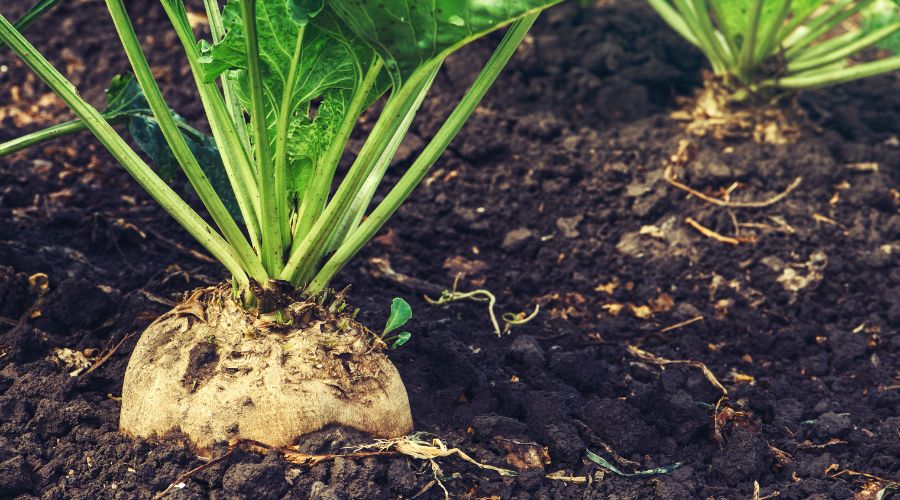Six new varieties added to the 2025 sugar beet list
9th April 2024
The British Beet Research Organisation (BBRO) has announced new and withdrawn varieties on the sugar beet list, bringing it to a total of 22 varieties for 2025.

The six new varieties are Chyma KWS, Josephina KWS and Smart Uma KWS – all from KWS UK – Magpie from SESVanderHave UK Ltd and ST Tweed and ST Trent from Strube UK.
Three varieties were withdrawn which means the 2025 list comprises 22 varieties.
Chyma KWS produced 101.0% adjusted tonnes at 16.9% sugar content. It has tolerance to cercospora but is not suitable for early sowing.
Josephina KWS from KWS UK Ltd produced 99.5% adjusted tonnes at 17.3% sugar content (the highest on the list). It had the lowest number of bolters in the early sown bolter trials.
ST Tweed from Strube UK Ltd produced 98.2% adjusted tonnes at 17.0% sugar content. It had lower establishment than the other varieties.
Magpie from SesVanderHave UK Ltd produced 97.7% adjusted tonnes at 17.1% sugar content.
ST Trent from Strube UK Ltd produced 97.7% adjusted tonnes at 17.2% sugar content (the second highest on the list).
Smart Uma KWS from KWS UK Ltd is an ALS tolerant variety. Its yield in the RL trials (treated with non-ALS herbicides) was 95.3% adjusted tonnes with 17.1% sugar content. ALS tolerant varieties are likely to produce higher yields when used with their partner ALS herbicides than with conventional products.
It should be noted that many differences between individual varieties are small and not statistically significant and should be treated with caution, BBRO said.
It should also be noted that there is very limited data on the tolerances of the new varieties to foliar diseases such as rust, powdery mildew and cercospera. Chyma KWS tolerance to cercosporawas not determined in RL trials but elsewhere and the data accepted by the RL Crop Committee.
READ MORE: Sugar beet experts give their advice for this spring
READ MORE: British Sugar will cover 75% of farmers’ diversion costs
Weather had a significant impact
Once again weather played a significant role in the running of the 2023 trials. Rains in early spring delayed drilling, and the subsequent dry conditions led to the loss of two RL trials – whilst a third was lost in the autumn due to flooding.
The wet autumn caused serious problems for trial operators trying to get the trials into the tarehouse and the data prepared for the RL Crop Committee (which meets each year to prepare the new RL tables).
This season the meeting had to be delayed until early January in order to harvest sufficient trials. Fortunately, none of the trials suffered significant damage from virus yellows or beet moth larvae.
Trial results
The results from five RL trials were used in the RL table along with those from four VL trials (APHA has changed from NL – National List, to VL – Variety List of GB and NI). Therefore, the main RL table is made up from 28 trials, nine in 2023, nine in 2022 and 10 in 2021.
Four of the 2023 RL trials were sown at 9cm spacing and then gapped whilst all the VL trials were sown to a stand. Harvest of the VL trials was completed by mid-October and the RL in December.
In the 2025 RL table the average yield was 102.7 adjusted tonnes/ha compared to 103.3 in the 2024 RL and 112.0 in the 2023 RL. Average sugar content (16.4%) was lower than the previous two years.
The average plant population was 102,500/ha (compared to 99,000/ha for the 2024 RL and 100,900/ha for the 2023 RL). There was a high number of bolters in the 2023 early sown bolter trials (8,863/ha) compared to 361/ha in 2022 and 3,387 in 2021.
The early-sown bolters trials are sown between mid-February up to the first five days of March. Growers should use the early sown bolting figures for guidance if sowing early, or if very cold or other stressful conditions are expected.
The six varieties indicated by X in the tables are not recommended for sowing before the 15th March but present a much lower risk for normal sowing. In some instances breeders may suggest some other varieties should not be sown early.
“Before ordering any of the special varieties bred for BCN, AYPR, yellowing virus tolerance, cercospora tolerance or ALS herbicide tolerance, growers should discuss options with the BBRO and breeders who will have more information on their performance and use in the presence of the specific problem,” advises Mike May, chair of BBRO.
Visit bbro.co.uk for a commentary on the trials and the RL table, along with the supplementary tables showing the three-year data for the varieties, plus data from trials untreated with fungicides and another with the vernalisation experienced in the early-sown bolter trials over the last three years.
Read more sugar beet news.
